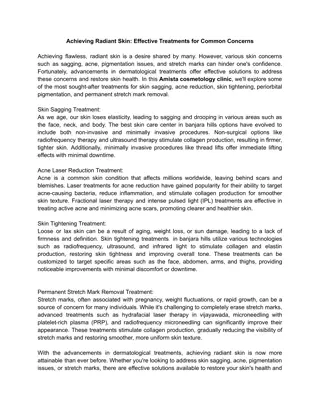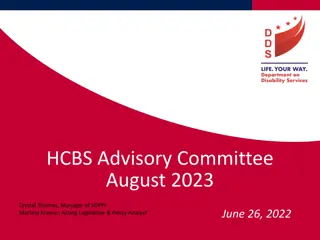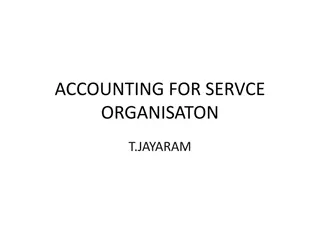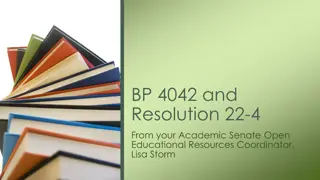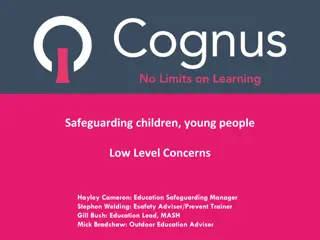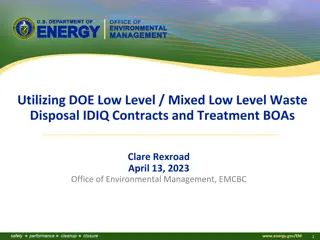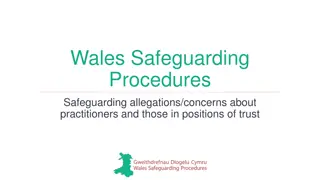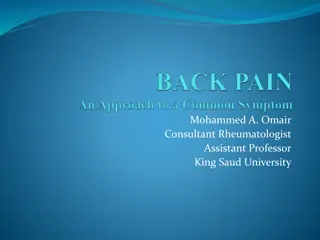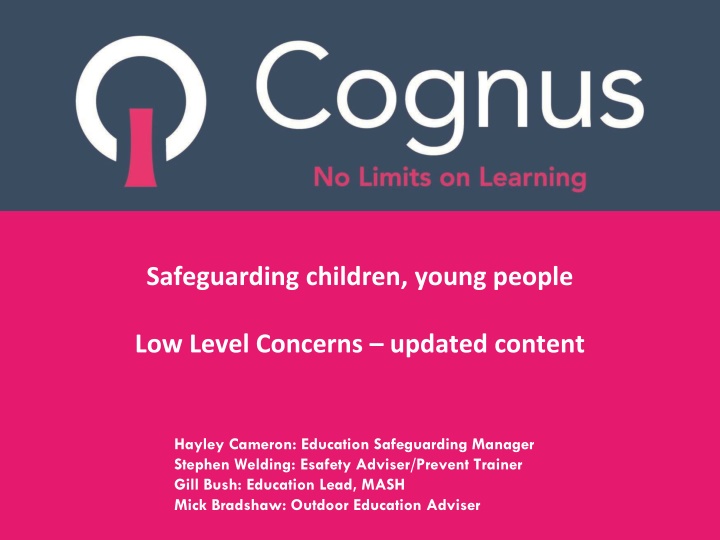
Low-Level Concerns in Safeguarding Children and Young People
Learn about low-level concerns in safeguarding, including examples and how to address them responsibly. Discover the importance of creating a culture that fosters transparency and early intervention to protect children and school staff.
Download Presentation

Please find below an Image/Link to download the presentation.
The content on the website is provided AS IS for your information and personal use only. It may not be sold, licensed, or shared on other websites without obtaining consent from the author. If you encounter any issues during the download, it is possible that the publisher has removed the file from their server.
You are allowed to download the files provided on this website for personal or commercial use, subject to the condition that they are used lawfully. All files are the property of their respective owners.
The content on the website is provided AS IS for your information and personal use only. It may not be sold, licensed, or shared on other websites without obtaining consent from the author.
E N D
Presentation Transcript
Safeguarding children, young people Low Level Concerns updated content Hayley Cameron: Education Safeguarding Manager Stephen Welding: Esafety Adviser/Prevent Trainer Gill Bush: Education Lead, MASH Mick Bradshaw: Outdoor Education Adviser
The term low level concern KCSIE 2022 'The term low-level concern does not mean that it is insignificant, it means that the behaviour towards a child does not meet the threshold of harm. A low-level concern is any concern no matter how small, and even if no more than causing a sense of unease or a nagging doubt - that an adult working in or on behalf of the school or college may have acted in a way that: is inconsistent with the staff code of conduct, including inappropriate conduct outside of work. does not meet the allegations threshold or is otherwise not considered serious enough to consider a referral to the LADO.
Examples of low-level concerns being over friendly with children; having favourites; taking photographs of children on their mobile phone; engaging with a child on a one-to-one basis in a secluded area or behind a closed door. Humiliating pupils.
Low Level Concerns Low-level concerns may arise in several ways and from a number of sources. For example: suspicion; complaint; or disclosure made by a child, parent or other adult within or outside of the organisation; or as a result of vetting checks undertaken. It is crucial that all low-level concerns are shared responsibly with the right person, and recorded and dealt with appropriately. Ensuring they are dealt with effectively should also protect those working in or on behalf of schools and colleges from becoming the subject of potential false low-level concerns or misunderstandings
The school culture Creating a culture in which all concerns about adults are shared responsibly and with the right person, recorded and dealt with appropriately, is critical. If implemented correctly, this should: encourage an open and transparent culture enable schools and colleges to identify inappropriate, problematic or concerning behaviour early minimise the risk of abuse ensure that adults working in or on behalf of the school or college are clear about professional boundaries and act within these boundaries, and in accordance with the ethos and values of the institution.
KCISIE 2022 - Governing bodies and proprietors Governing bodies and proprietors should have policies and processes to deal with any concerns (including allegations) which do not meet the harm threshold, referred to in KCSIE as low-level concerns. It is important that schools and colleges have appropriate policies and processes in place to manage and record any such concerns and take appropriate action to safeguard children.
Good Working practice As good practice, governing bodies and proprietors should set out their low-level concerns policy within their staff code of conduct and safeguarding policies as set out in Part two of KCSIE. They should make it clear what a low-level concern is and the importance of sharing low-level concerns, and an explanation of what the purpose of the policy is i.e. to create and embed a culture of openness, trust and transparency in which the school s or college s values and expected behaviour set out in the staff code of conduct are lived, monitored and reinforced constantly by all staff.
Be clear about what is expected of staff Schools and colleges can achieve the purpose of their low-level concerns policy by: ensuring their staff are clear about what appropriate behaviour is, and are confident in distinguishing expected and appropriate behaviour from inappropriate, problematic or concerning behaviour, in themselves and others. empowering staff to share any low-level safeguarding concerns. addressing unprofessional behaviour and supporting the individual to correct it at an early stage. handling and responding to such concerns sensitively and proportionately when they are raised. helping identify any weakness in the school or colleges safeguarding system.
Recording low-level concerns All low-level concerns should be recorded in writing. The record should include details of the concern, the context in which the concern arose, and action taken. The name of the individual sharing their concerns should also be noted, if the individual wishes to remain anonymous then that should be respected as far as reasonably possible. Schools and colleges can decide where these records are kept, but they must be kept confidential, held securely and comply with the Data Protection Act 2018 and the UK General Data Protection Regulation (UK GDPR).
Headteacher should be make the decision The headteacher/principal should be the ultimate decision maker in respect of all low-level concerns, although it is recognised that depending on the nature of some low-level concerns and/or the role of the DSL in some schools/colleges, the headteacher/principal may wish to consult with the DSL and take a more collaborative decision making approach.
Discussion with the LADO All low level concerns to be reported to the HT. The HT to then have a discussion with the LADO - even if it is just for assurance purposes. The LADO will be able to confirm if it is a low level concern or not - this creates another level of support to the HT.
Confidentiality The school/setting should have a discussion with the LADO, police and children s social care services to agree the following: who needs to know and, importantly, exactly what information can be shared; how to manage speculation, leaks and gossip; what, if any information can be reasonably given to the wider community to reduce speculation; and how to manage press interest if and when it should arise.
The role of the LADO The purpose of an initial discussion is for the LADO to consider the nature, content and context of the allegation and agree a course of action. The LADO may ask for further relevant additional information, such as previous history, whether the child or their family have made similar allegations previously and the individual s current contact with children. There may be situations when the police are involved straight away, for example if the person is deemed to be an immediate risk to children or there is evidence of a possible criminal offence. Where there is no such evidence, then a discussion of the allegations with the LADO in order to help determine whether police involvement is necessary.
Advice from the National LADO network - NLN Therefore, you are urged to contact the LADO even for low level concerns for the following reasons: 1) As an employer, you will need to determine your own unconscious bias and relationship with staff member before you can address thresholds. It is always better to have a discussion with someone in order to decide on a threshold of something that could be subjective. 2) As HT of a school, you are not expected to know LADO thresholds, therefore you cannot make the decision on what would or would not meet LADO threshold. 3) LADO may hold more information on that staff member which may mean that a low level concern becomes a more pressing matter. i.e when a number of low level concerns are recorded, it could lead to LADO investigation.
The role of the LADO (or Designated Officer) The role of the LADO (or Designated Officer) is set out in Working Together to Safeguard Children (2018) (Chapter 2 Paragraph 4) and is governed by the Local Authorities duties under section 11 of the Children Act 2004. The Officer LADO is responsible for managing allegations against adults who work with children. This involves working with police, children's social care, employers and other involved professionals. The LADO does not conduct investigations directly, but rather oversees and directs them to ensure thoroughness, timeliness and fairness. Ordinarily, to ensure impartiality, the LADO will not have direct contact with the adult against who the allegation has been made, or the family of the child/children involved but will, as part of their role ensure that these have information regarding outcomes. This guidance outlines procedures for managing allegations against people who work with children who are paid, unpaid, volunteers, casual, agency or anyone self employed.
The role of the setting and HR It is essential that any allegation of abuse made against a member of staff or volunteer in any organisation, is dealt with very quickly, in a fair and consistent way that provides effective protection for the child/children and, at the same time supports the person who is the subject of the allegation.
Early years settings The manager of the early years settings is the lead person and should be notified if there is an allegation made against a member of staff. The manager will make a referral to the LADO and act on their advice. The manager will notify Ofsted (significant incident) Should a concern about a member of staff be raised directly with the Ofsted regulatory team, then they will make a referral directly to the LADO.
Whistleblowing Procedure Appropriate whistleblowing procedures, which are suitably reflected in staff training and staff behaviour policies, should be in place for such concerns to be raised with the School s senior leadership team. Where a staff member feels unable to raise an issue with their employer, or feels that their genuine concerns are not being addressed, other whistleblowing channels may be open to them; The NSPCC whistleblowing helpline is available as an alternative route for staff who do not feel able to raise concerns regarding child protection failures internally or have concerns about the way a concern is being handled by their School. Staff can call 0800 028 0285 8am to 8pm Monday to Friday help@nspcc.org.uk
An Ongoing vigilance Low level concerns Nursery worker guilty of Sexually Abusing children In 2009, Vanessa George was convicted of sexually abusing children at the nursery where she worked. The subsequent SCR (safeguarding practice review) identified a range of warning signs and failings in the nursery that allowed abuse to happen. She did not undergo a formal interview when appointed. She made inappropriate and explicit sexual references to other staff members Staff were aware of adult pornography on her phone Staff were uncomfortable, but did not feel able to challenge her There was no whistleblowing policy There was no safeguarding training for staff Changes in her behaviour were not seen as significant, including her use of the cubicle to change nappies rather than the general changing area. (I have got a bad back!!!!!!)
Remember - Safer Recruitment is not only about vetting people before they start, but to also ensure that the staff code of conduct is strong to identify inappropriate behaviour in appointed staff.
Safer Recruitment Bichard 2004 For those agencies whose job it is to protect children and vulnerable people, the harsh reality is that if a sufficiently devious person is determined to seek out opportunities to work their evil, no one can guarantee that they will be stopped. Our task is to make it as difficult as possible for them to succeed... Bichard Report, 2004, p 12, para 79
An ongoing culture of vigilance Features of a safeguarding culture: Open, no secrets Belief that it could happen here Clear procedures for reporting concerns Support in raising concerns and commitment to take action Setting acceptable standards of behaviour Policies and procedures put into practice and monitored Induction and probationary periods. Commitment to safeguarding and an ongoing culture of vigilance
Allegations against Staff Governors and all school staff should: Be familiar with the procedures on handling allegations. Know who allegations should be reported to - the LADO: Sutton: 8770 4532 Merton: Croydon: 8726 6000 ext 24334 8545 3187 Be familiar with the school/organisation s policies on: Information sharing and whistleblowing Know the procedures to make a referral to the DBS if a person in regulated activity has been dismissed/removed or would have been if they had not resigned. Make accurate records of meetings/discussions
Key messages for all staff REMEMBER it could happen here Always act in the best interest of the child
Thank You for Listening Hayley Cameron: Education Safeguarding Manager Stephen Welding: Esafety Adviser/Prevent Trainer Gill Bush: Education Lead, MASH Mick Bradshaw: Outdoor Education Adviser
Managing allegations: we all have a responsibility to report Where it is alleged that a member of staff has: Behaved in a way that has harmed a child, or may have harmed a child; Possibly committed a criminal offence against or related to a child; Behaved towards a child or children in a way that indicates he or she may pose a risk of harm to children; or Behaved or may have behaved in a way that indicates they may not be suitable to work with children. (Transferable Risk) The Head Teacher/Chair of Governors/manager will contact the Local Authority Designated Officer (LADO) who has overall responsibility for oversight of the procedures for dealing with allegations. The LADO will provide advice and guidance, in addition to liaising with the police and other agencies, and monitoring the progress of cases to ensure that they are dealt with as quickly as possible consistent with a thorough and fair process.




